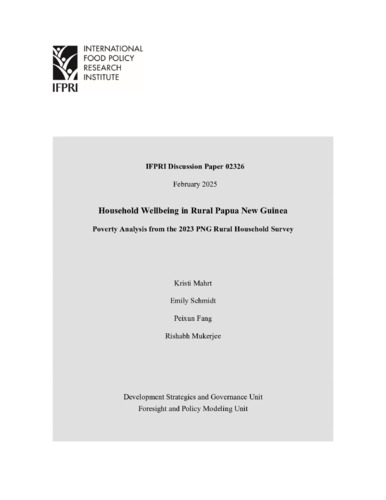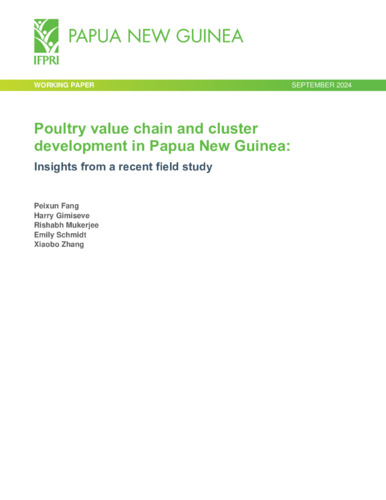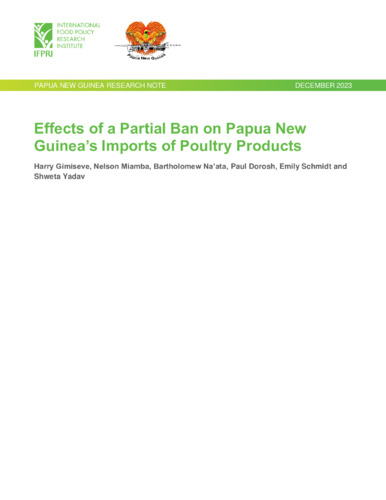Household wellbeing in rural Papua New Guinea: Poverty analysis from the 2023 PNG Rural Household Survey
This analysis provides the first poverty assessment using the cost of basic needs approach in Papua New Guinea in 1.5 decades. The cost of basic needs poverty methodology is the standard approach to estimating poverty in low- and middle-income countries. It aims to reflect the cost of a food basket and nonfood needs to secure a healthy life and minimum standard of living. Using the cost of basic needs approach, we calculate and compare two poverty measurements. First, we compute a standard (traditional) cost of basic needs poverty line where the food poverty line is defined by a dietary energy (calorie) threshold. Second, we extend the standard cost of basic needs approach to calculate a healthy diet food poverty line that meets both the dietary energy threshold, as well as recommended nutrition targets.
Results suggest that 43 percent of sample individuals live below the standard cost of basic needs poverty line. When recalculating the poverty line to account for a healthy diet threshold (a mix of food groups set at quantities consistent with dietary guidelines), we find that 64 percent of the sample is below the healthy diet poverty line. On average, households within the survey sample over-consume the recommended daily quantity of staples and fats, however daily consumption of vegetables, fruits, and protein-rich foods (e.g., fish, meat, nuts) fall short of recommended targets.
The above poverty analysis begs the question of what characteristics are associated with higher income earning households (we use per capita consumption-expenditure as the rural income proxy). Regression analysis suggests that greater production assets (land and labor), education, market access, and income diversification (via non-farm businesses and migrant remittances) are associated with higher household incomes. While we hypothesized that households engaged in cash crop sales (i.e. cocoa, coffee, betelnut, horticulture) would be significantly better off, we find that only cocoa farming households have significantly higher incomes.
The regression analysis reveals that facilitated access to a market is one of the most important indicators explaining per capita consumption-expenditure (i.e. income per person). Households that are more than 4 hours from a market have about 25 percent less income compared to households that are within 2 hours from a market. Conversely, households that report owning a small business (non-farm enterprise) are associated with approximately 25 percent greater consumption-expenditure per capita. While market access and income diversification are important to household incomes, weather shocks such as floods are associated with significant declines (8 percent) in per capita consumption-expenditure. Given the above results, a pilot social safety net program in more remote (greater than 4 hours from a market) and flood prone areas, where household incomes are significantly lower, may provide important insights on the most efficient mechanisms to build resilience among PNG’s vulnerable population. Including a community asset building component (e.g., building and maintenance of rural feeder roads and bridges) in the social safety net program could be tested to understand how best to support rural-urban market linkages and incentivize off-farm employment.
Understanding that a social safety net program requires significant resourcing (including financial, logistics and time), there are other opportunities to improve rural welfare within the country. Facilitating remittance transfers from migrants to rural households via electronic banking services and easing banking costs for rural households may increase remittance payments. In addition, facilitating access to primary education via reduced school fees and increasing school attendance via school feeding programs could provide greater income earning opportunities for better educated households, as well as (if designed properly) fill some of the nutrition gaps demonstrated by the large share of individuals that live under the healthy diet poverty line presented in this paper.
Authors
Mahrt, Kristi; Schmidt, Emily; Fang, Peixun; Mukerjee, Rishabh
Citation
Mahrt, Kristi; Schmidt, Emily; Fang, Peixun; and Mukerjee, Rishabh. 2025. Household wellbeing in rural Papua New Guinea: Poverty analysis from the 2023 PNG Rural Household Survey. IFPRI Discussion Paper 2326. Washington, DC: International Food Policy Research Institute. https://hdl.handle.net/10568/173408
Country/Region
Papua New Guinea
Keywords
Oceania; Expenditure; Households; Income; Poverty; Nutrition; Surveys; Household Surveys
Access/Licence
Open Access







